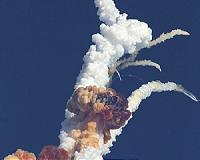 |
Moscow, Russia (RIA Novosti) Apr 26, 2011 Russia is planning to develop a new carrier rocket by 2015 while continuing the work on the Angara family of space boosters, Prime Minister Vladimir Putin said on Wednesday. The Rus-M carrier rocket is being developed by the Energia space corporation, to launch new-generation spacecraft from the Vostochny space center currently under construction in the country's Far East. "We are planning to start test-launches of light and heavy Angara rockets in 2013, and develop the Rus-M carrier rocket by 2015," Putin said during his annual address to parliament. A draft model of Rus-M was first presented at the MAKS 2009 air show in Moscow. The launch vehicle faces strict safety requirements, and will have to guarantee a takeoff or ensure a continuous flight or an ejection with a safe landing even with one of its engines is out of action. Energia corporation has already received about 800 million rubles ($28.5 mln) of budget funds for the Rus-M project. The two-stage Rus-M is expected to be the main launch vehicle for the Prospective Piloted Transport System, a new manned spacecraft which is to replace the Soyuz rocket.
Source: RIA Novosti
Share This Article With Planet Earth
Related Links - Rocket Science News at Space-Travel.Com
 Weak Russian component downed Indian rocket Says Ex-ISRO chief
Weak Russian component downed Indian rocket Says Ex-ISRO chiefChennai, India (IANS) Apr 25, 2011 The destruction of India's Geosynchronous Satellite Launch Vehicle (GSLV) in mid air in 2010 was due to an inherent weakness in a component in the Russian supplied cryogenic engine. "We did several simulation tests to find out why the connectors - the wires that carry command signals from the onboard computers at the top to the rocket's engines down below - snapped," former ISRO chief Madh ... read more |
|
| The content herein, unless otherwise known to be public domain, are Copyright 1995-2010 - SpaceDaily. AFP and UPI Wire Stories are copyright Agence France-Presse and United Press International. ESA Portal Reports are copyright European Space Agency. All NASA sourced material is public domain. Additional copyrights may apply in whole or part to other bona fide parties. Advertising does not imply endorsement,agreement or approval of any opinions, statements or information provided by SpaceDaily on any Web page published or hosted by SpaceDaily. Privacy Statement |